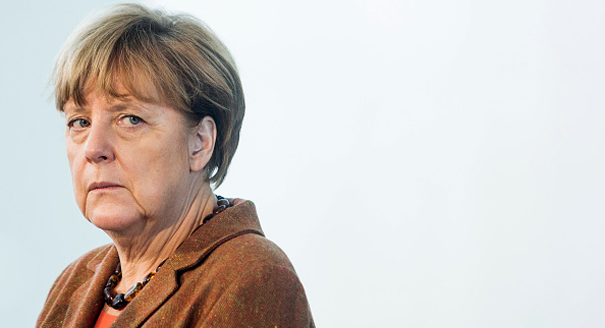Angela Merkel’s position as Europe’s undisputed leader is under fire.
True, it is the German chancellor who is setting the agenda for how Europe, specifically Germany, can cope with the flow of refugees and migrants reaching the European Union. And Merkel has no contenders in Germany or in Europe. But nor has she much support from leaders across Europe who prefer to pander to populist movements than to defend solidarity and values.
For her critics, it was bad enough that Merkel did the deal without consulting her EU partners. Worse was that Merkel, so desperate to stop the flow of migrants reaching Germany, made a pact with an autocrat who no longer pretends to uphold the rule of law, media freedom, or an independent judiciary.
She had little choice. Months of trying to persuade her EU counterparts on humanitarian, moral, legal, and political grounds to take a share of the refugees and migrants came to naught. For the first time since becoming chancellor in 2005, Merkel had to find ways to reconcile her values with realpolitik.
These twin policies pursued by Merkel will be put on the line on March 13, when voters in the three German states of Rhineland-Palatinate, Baden-Württemberg, and Saxony-Anhalt will give their verdict on Merkel’s policies.
Much of the focus is on the Alternative for Germany (AfD) and, of course, on Merkel’s conservative Christian Democratic Union (CDU) party. The Euroskeptic AfD is vehemently opposed to Merkel’s refugee policy. Over the past several months, the party has become a nesting place for far-right sympathizers but also disaffected CDU supporters.
For the moment, the AfD seems to be on a roll. In municipal elections on March 6 in the state of Hesse, home to Germany’s financial center of Frankfurt, the party was catapulted into third place after winning over 13 percent of the vote. It is now sitting on many town councils.
The AfD’s victory sounded alarms bells not only among Merkel’s supporters but also among the public as a whole. A recent opinion poll showed that over 75 percent of respondents believed that the AfD was not distant enough from the far right. The far right is a phenomenon that the majority of Germans still abhor.
Yet the appeal of the AfD, which was founded by middle-class professionals but has mutated into a right-wing movement, remains a magnet for Germans resentful of Merkel’s (no longer) open-door policy toward refugees. The same Germans are just as resentful that almost no other EU country will give Germany the solidarity that it has consistently extended to other EU member states, particularly those in Central Europe.
Local election results, however, do not normally create a pattern for regional or federal elections. But this time, there’s a difference. Almost every part of Germany has been affected by the refugee and migrant crisis.
That is why Julia Klöckner, who is the CDU’s candidate for minister president in Rhineland-Palatinate, where she is attempting to unseat the incumbent Social Democrat, has distanced herself from Merkel’s refugee policy. In this wine-making region, the CDU, remarkably, is running neck and neck with the Social Democrats. Support for Merkel is holding up.
In Baden-Württemberg—Germany’s economic powerhouse, where much of the country’s Mittelstand (small and medium-sized companies) is based—the Green minister president, Winfried Kretschmann, is expected to be reelected. Unlike Klöckner, the avuncular Kretschmann has openly supported Merkel’s refugee policy. In fact, across most of Germany, support for the Greens is rising as the party identifies with Merkel’s stance and the need for a Europe-wide solution to the migrant crisis.
Over in the Eastern region of Saxony-Anhalt, the AfD is poised to do very well. But barring any major upsets, the CDU is expected to remain the largest party, according to recent opinion polls. Not only that. A survey by the forsa polling company showed that Merkel’s approval ratings had risen to over 50 percent, the highest so far in 2016.
However, these regional elections are not just about Merkel’s policies and leadership. They are also very important in the European context. They are about whether Germans will resist the cheap, xenophobic, and populist rhetoric that has brought governments to power in several EU member states or opt for a leader who has had to balance values and principles with the unpleasant cost of realpolitik.





.jpg)
